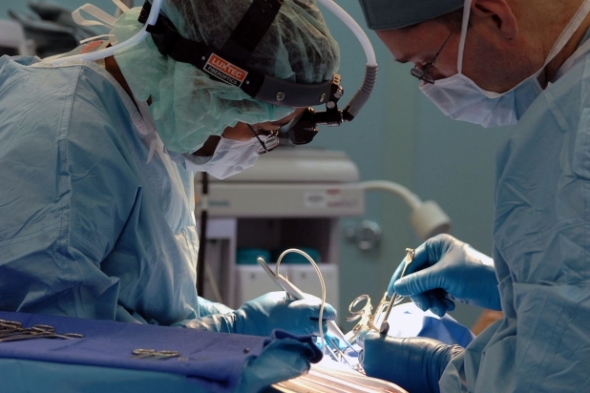A few weeks ago I taped the first episode of my new public radio show. I thought I sounded good enough, and the producer assured me that I would sound even better after I got over my cold. This would have been reassuring, except that I didn't have a cold.
Fearful of being fired my first day on the job, I immediately called my primary care physician (PCP) to get some advice on how to sound less hoarse. The doctor's office promptly scheduled a visit with an Ear, Nose & Throat specialist, only four days later.
The specialist scoped my nose and announced that I had polyps in my sinuses. She said she would schedule me for a CT scan of the sinuses, and offered three alternative treatments, which, she added truthfully, may or may not work.
- Steroid-based nasal spray
- Steroid-based nasal spray with a three-week course of antibiotics
- Day surgery followed by a saline flush for a week
"So," she asked, about seven minutes into the appointment, "which do you want to do?"
"Um," I replied. "Shouldn't we try the most conservative therapy first?"
"Well, you could."
I begged off the surgery by quite correctly observing that I wasn't very adept at flushing my nose out, so that I would prefer one of the non-surgical alternatives. "I'm not sure I need the antibiotics because I don't think this is bacterial," I said.
"A lot of patients report relief with the antibiotics," she replied, almost as if she were cast as the "before" picture in an evidence-based medicine textbook.
"Isn't three weeks a long time to be taking antibiotics?" I asked.
"Yes. Some people say that."
I opted for the nasal spray. I elected not to schedule the sinus CT scan. Seemed like a lot of cost and inconvenience ... and didn't I just get a diagnosis anyway? So I didn't follow up on it.
Except that the sinus scan was thoughtfully scheduled for me, as I learned when a scheduler called me the very same day. I ignored my first voicemail from the scheduler, but after the third I realized they really did expect me to show up (that very Friday, no less), and it occurred to me I might get billed unless I affirmatively called to cancel the appointment.
And, that is what is wrong with fee-for-service medicine. Most well-insured people would have gone along with the recommended program, getting the scan, the surgery, and who knows what else.
The bottom line is, in twelve short minutes, this visit encapsulated everything that is wrong with traditional fee-for-service medicine, of the type that someday, with any luck, is going to be replaced by capitated ACOs using patient-centered medical homes, supported by electronic medical records (EMRs), to refer to salaried specialists who don't get to bill a big chunk of money each time they do a surgery.
Except that this practice is already a designated patient-centered medical home, it already uses an EMR, it is already partially capitated by its major health plan, and its specialists are already salaried.
That is the "punchline," and explaining a joke often ruins it, but healthcare isn't a joke so I'll explain.
Just changing practice incentives may not change the behavior of individual physicians, especially specialists who even in most capitated practices are/will still be paid on the basis of work performed, somehow, to some degree. (In this practice, work performed affects physician salary for the following year.)
Further, patient satisfaction also factors into compensation, and what can be more satisfying for patients than promptness and responsiveness and action? As for the checks-and-balances provided by the EMR, it turns out that the EMR is what expedited the referral in the first place. Years ago it had been noted that I had a deviated septum (like about half the world, as it turns out). That information was duly stored in my EMR, so that my primary care physician had grounds to make a referral at her fingertips, without needing me to see her first.
The coda on this story? To try to overcome this hoarseness, I took the steroidal nasal spray twice a day for a week. Then I read the FDA insert, which listed the following as a side effect: hoarseness. I stopped the spray, and told this story to my producer. My producer suggested tea with honey during each taping, surely the most conservative therapy ... and I still have my job.
So domestic policy wonks in the Washington, DC market can now hear me on The Big Fix Saturdays at 4 PM on WAMU 88.5, at least through January 15, when the funding runs out. I'm still a bit hoarse, but thanks to my producer I no longer sound like that guy on Boardwalk Empire whose vocal chords were blown up during World War I.
Postscript: The first episodes have already aired, and while a few people complained, not without justification, about my hosting skills, no one wrote in to say: "This guy sounds like he needs his polyps removed."





